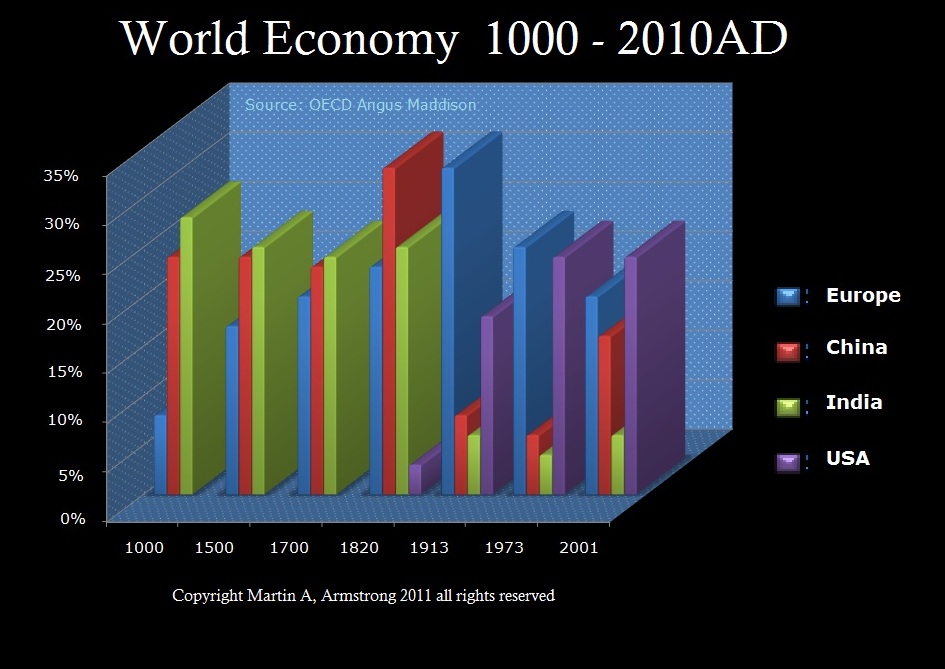Posted Aug 8, 2016 by Martin Armstrong
QUESTION: Mr. Armstrong; I recently read a book which claims that the disparity of wealth among nations is something recently unfolding post-Columbus. The thesis claims that before 1500, the income differences between nations were small. It proposes that only since the discovery of America, the interplay between geography, globalization, technological change, and economic policy has determined the wealth and poverty of nations. It claims that the West pioneered new technologies that have made them richer whereas prior to the Industrial Revolution, most of the world’s manufacturing was conducted in Asia. It attributes the Industrial Revolution to the economic reduction of Asia transforming then into underdeveloped countries based on agriculture. The thesis is that a few countries – Japan, Soviet Russia, South Korea, Taiwan, and perhaps China are catching up with the West through creative responses to the technological challenges. Would you agree with this thesis?
LHG
Hong Kong
ANSWER: No. This is a review of only the post-Dark Age period which is akin to saying the stock market only rises by reviewing just the history back to 1948. Yes, the Industrial Revolution advanced Western society. Creating the steam engine advanced the West greatly. However, what may Lydia great was roads. But those roads were used by Cyrus the Great of Persia to conquer them. Athens rose as a power for banking and insurance. As insurance was invented, shipping expanded transforming it into the next financial capital of the world. The Philip of Macedonia conquered Greece and his son Alexander the Great took on the world. He tried to conquer India, but was driven back. Rome then conquered the West and it was a single language along with Roman roads that made it the financial capital of the world peaking in 180AD about the same time China peaked under than Han Dynasty.
It was the fall of Rome that send the title of the Financial Capital of the World to Constantinople. When that fell, it moved to India. China then took the title from India and then Britain took the title from the Spanish. It was World War I which sent the title to the United States. Each of these empires saw the same trend moving away from agriculture. Aristotle in Politics wrote about the new market-economy that was emerging. He saw the traders who were men making money from money. This actually influenced Karl Marks.
 Aristotle did not understand the economic evolution process dynamically which has taken place in ALL societies throughout recorded history. What Aristotle saw was the abandonment of what I have dubbed the Villa Economy of self-sufficiency and the gravitation of both people and capital toward commerce. This part of the economic cycle usually involves people becoming attracted to the big city abandoning the farm life. Every society sees this oscillation both in the concentration of capital as well as people.
Aristotle did not understand the economic evolution process dynamically which has taken place in ALL societies throughout recorded history. What Aristotle saw was the abandonment of what I have dubbed the Villa Economy of self-sufficiency and the gravitation of both people and capital toward commerce. This part of the economic cycle usually involves people becoming attracted to the big city abandoning the farm life. Every society sees this oscillation both in the concentration of capital as well as people.
Aristotle clearly lamented over the loss of the Villa Economy. The old rural ways were giving way to capitalism. Even at the start of the United States, we will see that Thomas Jefferson and John Adams both shared that view that true wealth was created by the rural farm life. Yet Aristotle’s imperfect understanding of the dynamics at work contributes to centuries of debate and influence, nonetheless, Aristotle tried to draw a line between capitalism that would assist economic growth and that which would fueled these booms and busts driven by speculation in his mind’s eye.
“Now money-making, as we say, being twofold, it may be applied to two purposes, the service of the house or retail trade; of which the first is necessary and commendable, the other justly censurable; for it has not its origin in [1258b] nature, but by it men gain from each other; for usury is most reasonably detested, as it is increasing our fortune by money itself, and not employing it for the purpose it was originally intended, namely exchange.”
(Politics, Chapter X §1258b-1259b translation by William Ellis 1912)
What Aristotle did not comprehend was the concentration of capital. There is no difference between a landowner who leases his land for a farmer to grow crops and someone who has excess cash to likewise lease it out for a fee known as “interest.” Aristotle thus focused in on this concept of making money from money. He did not quite understand that when a city or a nation becomes the center of the global economy, capital concentrates and the natural evolution process begins.
So the thesis of which you ask is not well established for it merely propagated a theory post-Dark Age. There was the same economic processes that predated our modern era.

No comments:
Post a Comment